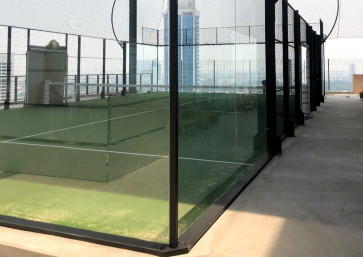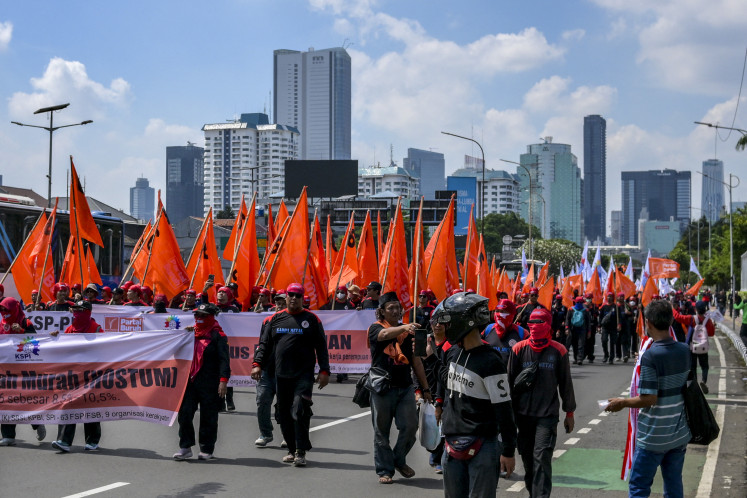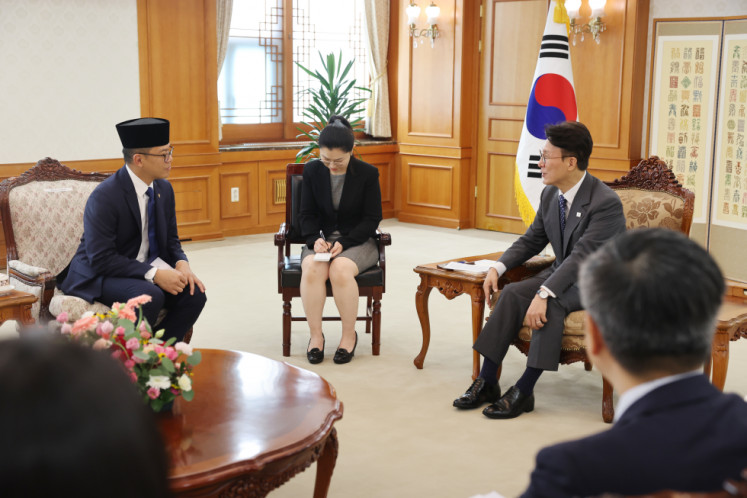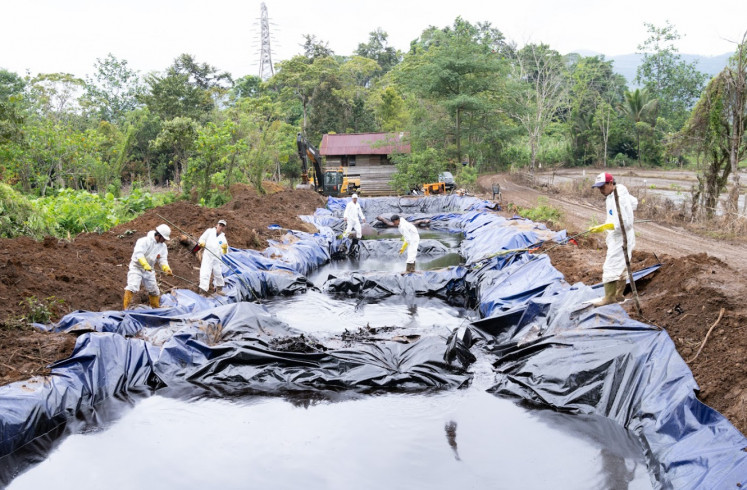Popular Reads
Top Results
Can't find what you're looking for?
View all search resultsPopular Reads
Top Results
Can't find what you're looking for?
View all search resultsFirms maneuver to survive
Several manufacturers are considering delaying the importing of their raw materials while others are having to increase the prices of their products in order to survive following the depreciation of the rupiah
Change text size
Gift Premium Articles
to Anyone
S
everal manufacturers are considering delaying the importing of their raw materials while others are having to increase the prices of their products in order to survive following the depreciation of the rupiah.
They are frantically maneuvering to minimize the impact of the crisis.
Rino Bernando, an analyst with Bank Mandiri, said the impact of the weakening rupiah would be seen in the companies' lower output, with the steel and iron industry feeling the impact within one month.
Citing previous Mandiri research, Rino said wholesalers and retailers would face the impact within two months, while the textile industry would see lower production within three months.
State-owned steel company PT Krakatau Steel is already feeling the pinch, saying it needs to tighten its belt.
'These days, we are trying to be efficient. We are also looking at what elements of spending, including capital expenditure, can be delayed until the global and domestic situation improves,' Krakatau Steel president director Irvan Kamal Hakim said.
The company spends a lot in US dollars to import materials, such as iron ore pellets, while most of its earnings are in rupiah because its products are mostly sold in the domestic market.
Hedging was taken to avoid a currency mismatch on imports, he said.
Krakatau Steel is currently working on a number of large, high-cost projects including a blast furnace complex, a port expansion, a power plant and the development of a water-pipe system.
The company has also moved to reduce its dependency on imports by developing a sponge iron production facility in South Kalimantan.
The sponge iron will supply material for Krakatau Steel's blast furnace in Cilegon, meaning that the company will no longer need to import iron ore pellets. Meanwhile, pharmaceutical company PT Kalbe Farma, which imports almost all raw materials to support its production, will likely focus on selling products that offer higher margins to offset greater spending on imports.
'We have around 400 to 500 items with different profit margins. We can also switch our marketing strategy to focus on better markets,' Kalbe Farma director Vidjongtius said.
Customers will also share the burden as some companies may pass their increased production costs on to them.
Fitch Ratings said some Indonesian manufacturers with dollar-denominated debts had the flexibility of increasing their selling prices.
The companies, all of whom are market leaders, include plastics packaging company PT Berlina, food producer PT Jamfa Comfeed Indonesia and paper maker PT Fajar Surya Wisesa.
National flag carrier Garuda Indonesia would also be able to pass on its growing costs, particularly to corporate passengers, according to Fitch.
Fitch also said that property companies, such as PT Lippo Karawaci, PT Alam Sutera and PT Kawasan Industri Jababeka, which had mismatches in earning and debt denominations, would be able to contain foreign exchange (forex) losses over the next 12 months, thanks to hedging measures and high profit margins, which would absorb short-term impact.
'Nevertheless, a prolonged period of depreciation of the rupiah may heighten negative pressures on their ratings,' Fitch said.
Alex Rusli, the president director of telecommunications company PT Indosat, expected the exchange rate fluctuation to be temporary.
'We have no debts due this year. We are ready for short-term disruptions lasting a maximum six months,' Alex said, adding that the company had imposed hedging measures for up to 35 percent of its debts.
Despite potential hardships in the coming months, giant textile companies have a slightly better outlook.
Jakarta-listed textile firm PT Sri Rejeki Isman (Sritex), said it was enjoying a slight benefit from the faltering rupiah as earnings from exports could offset the spending on the importing of raw materials, both of which were conducted in US dollars.
'Around 70 percent of the company's revenue is in US dollars. Our spending on raw material imports is about 66-68 percent of that revenue, so there is around a 2-4 percent margin. We are naturally hedged,' Sritex corporate secretary Welly Salam said.
Welly said the company welcomed the government's tax incentive policy, part of its recently introduced economic stimulus package. Under the policy, labor-intensive companies that export at least 30 percent of their products will receive tax breaks.
'The company [Sritex] meets this criterion and is now waiting for an update of the policy,' Welly said.










